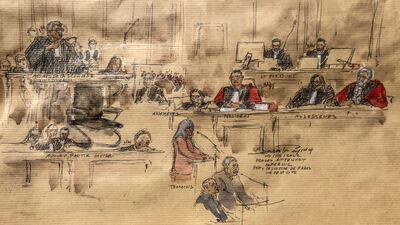A Lebanese-Canadian academic went on trial in absentia in France on Monday, 43 years after four were killed and 46 wounded in a bombing outside a Paris synagogue in 1980.
Hassan Diab is the only suspect in the case, which has been marked by years of legal wrangling. He denies any involvement in the attack.
The explosion took place outside the Copernic street synagogue in Paris's 16th district on the evening of October 3, 1980. At the time, 320 worshippers were inside the synagogue, marking the end of a Jewish holiday.
French authorities identified the Popular Front for the Liberation of Palestine-Special Operations as the group behind the attack, but no one ever claimed responsibility for it.
In 1999, French investigators accused Mr Diab of planting the bomb, arguing that his likeness matched police sketches and that a handwriting analysis confirmed his identity.
They also claimed to have found a passport in his name, seized in Rome in 1981, with entry and exit stamps from Spain, where the plan for the attack was believed to have originated.
Canada extradited Mr Diab to France in 2014, but he was released from pretrial detention after three years due to a lack of evidence. He then returned to Canada.

France’s court of appeal ruled in January 2021 that Mr Diab must stand trial on terrorism-related charges. If convicted, he could receive a life sentence.
Mr Diab's absence from the trial has drawn criticism from the prosecution and victims' families, who attended the first day of proceedings.
Prosecutor Benjamin Chambre called it a “grave abomination for justice and for the victims 43 years after the events”.
Survivors and victims' lawyers, however, still see the trial as a step forward.
Bernard Cahen, a lawyer for two families who lost loved ones, said: “It’s a positive development that the trial is taking place, even if he [the suspect] will not be there and even if he is acquitted.”
David Pere, a lawyer for a then-14-year-old victim who was celebrating his bar mitzvah at the time of the attack, said: “A terrorist attack is something that haunts you every day of your life … A trial is a result [of an attack] not a revenge for it.”
The trial is expected to last two weeks and a verdict is expected by April 21.
Mr Diab's lawyers have argued that the French judicial authorities have pursued him in a case of mistaken identity.
NGOs, including Amnesty International, have also backed Mr Diab, stating that his assertion that he was in Lebanon at the time of the attack was credible.


